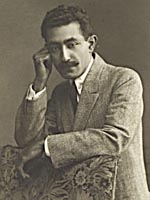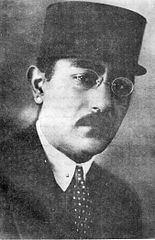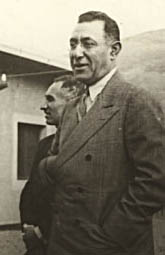Ali-Akbar Davar
Ali-Akbar Dāvar ( Persian علیاکبر داور, known as Mirza Ali-Akbar Khan-e Dāvar ; * 1888 in Tehran ; † February 10, 1937 ibid) was an Iranian lawyer and politician. As Minister of Justice under Reza Shah Pahlavi , he took on the task of fundamentally reforming the Iranian legal system , which was previously based on Sharia law , and redesigning it according to the Western model, taking into account Islamic legal principles. As finance minister he laid the foundations for a modern tax system and as economics minister he massively promoted the development of the Iranian economy by granting low-interest loans to company founders.
Life
Ali-Akbar Davar was born as Mirza Ali-Akbar Khan in Tehran in 1888. His father Khazen Khalvat served as treasurer at the court of Naser ad-Din Shah . Ali-Akbar completed his school education and his first academic training at Dar-ol Fonun in Tehran.
Early years
Ali-Akbar began his professional career in the Justice Department at a district court. He was appointed District Attorney for Tehran in 1910 at the age of 22. In the following period Davar published political comments in the newspaper Ra'ad (Donner), edited by Seyyed Zia al Din Tabatabai .
In order to expand his legal education, Ali-Akbar Davar went to Switzerland and enrolled in the law faculty of the University of Geneva . There he acquired the Diplôme de Licencié en Droit (diploma in law) on July 15, 1915 and completed his studies with a doctoral thesis.
When he learned in Geneva that there had been a coup in Iran on February 21, 1921 , and that his friend Seyyed Zia al Din Tabatabai had become Prime Minister, Davar decided to end his stay in Geneva and return to the United States as soon as possible To return to Iran. But when Davar arrived in Tehran, Tabatabai had already resigned as prime minister and Ahmad Qavam had become prime minister.
MP
Davar plunged into political work, founded a party, the “Radical Party” (Hezb-e Radical) and a newspaper “The Free Man” (Mard-e Azad) , in which he himself regularly published articles. He also worked first as director and later as director general in the Ministry of Education. In the upcoming parliamentary elections, Ali-Akbar Davar ran for the Iranian parliament and was elected first as a member of Varamin (Tehran) and later as a member of Lar ( Fars ) in the fourth, fifth and sixth legislative periods .
Davar played a significant role in the decision taken by the Iranian parliament to abolish the Qajar dynasty and make the then Prime Minister Reza Khan Reza Shah Pahlavi. Davar drafted the articles to amend the constitution and openly advocated their adoption in parliament.
minister
After Reza Khan was elected Shah, Davar became Minister of Public Works in Prime Minister Mohammad Ali Foroughi's cabinet. He drafted the laws establishing the Iranian railway company and founded a commercial college.
In the subsequent cabinet of Prime Minister Hassan Mostofi , Davar became Minister of Justice. As Minister of Justice, Davar did an extraordinary job. In March 1926, with the approval of parliament, he dissolved the entire judicial apparatus of Iran in a unique action in the history of the legal system and began to reform the legal system from the ground up. The judges, who until then had only been trained at theological schools of law, were dismissed and new, young lawyers were trained in Western legal principles in compact courses. A newly drafted civil code based on the model of the French Civil Code was drawn up in collaboration with Islamic legal experts. This new law took into account both Western and Islamic legal principles and is still valid in Iran today with only minor changes.
On April 25, 1927, the newly created legal system was solemnly put into effect. On this day, all special rights for foreign nationals were also revoked. The newly introduced courts based on the western pattern began to work in Tehran. More than 600 newly appointed judges have now ruled. After a trial phase and the training of other judges, the new legal system was gradually extended to all cities in Iran.
The reforms of Davar also included the introduction of a social system through the establishment of a kind of registry office, the "Office for Registration" ( Edareh-ye Sabt-e Ahval ), the introduction of an identity card in which, on the basis of the "Law on Registration and Documentation" ( Qanun-e Sabt-e Asnad ) the name and the dates of birth, marriage, divorce, children and the date of death were recorded. With the "Law on Marriage and Divorce" ( Qanun-e Ezdevag va Talāq ), Davar implemented a modern family law and through the "Law on the Registration of Real Estate" ( Qanun-e Sabt-e Amlak ) the registration of real estate by a land registry office .
On November 22, 1928, Davar became Minister of Finance in the cabinet of Prime Minister Mehdi Qoli Khan Hedayat . Even under the Prime Minister Mohammad Ali Foroughi , who succeeded Hedayat in 1933 , Davar remained finance minister. During this time he devoted himself to modernizing the Iranian economy by founding numerous state-owned companies. He coordinated several barter deals with Germany and the Soviet Union, from which Iran obtained industrial goods in exchange for the delivery of agricultural products.
After Foroughi resigned in 1935, Davar expected to be proposed to Parliament as Prime Minister by Reza Shah. Reza Shah, however, preferred Mahmud Jam . Ali-Akbar Davar became Minister of Economy. As Minister of Economic Affairs, Davar founded Iran's first state insurance company, reformed tax legislation and thus saved Iran from imminent national bankruptcy.
Early death
Ali-Akbar Davar died of an opium overdose on February 10, 1937 . The day before, Davar had been called to Reza Shah to inform him about the lending to Iranian companies. Reza Shah must have reproached Davar during this conversation. Davar went to his study that evening and wrote two letters, a long letter to Reza Shah, in which he summarized his political work, and a short farewell letter to his wife. Then he drank a glass of opium dissolved in water. He was found lifeless early in the morning on February 10th. His death came as a shock to the people of Tehran, because Davar was one of the most popular politicians in Iran. Thousands spontaneously gathered for a huge funeral procession to remember the dead Davar.
Ali-Akbar Davar was then and is still considered to be one of the most important reformers in Iran, thanks to whom Iran owes its development to a nation-state with a modern, western character. Ali-Akbar Davar, Abdolhossein Teymurtasch and Firuz Nosratdoleh were the ones who politically prepared the rise of Reza Khan to the Shah of Iran and then implemented it through parliament. Abdolhossein Teymurtasch had died a violent death in a Tehran prison in 1933. Obviously Davar wanted to avoid a similar fate by his suicide.
In his memorial address to the assembled lawyers of the Ministry of Justice, Reza Shah Ali-Akbar paid tribute to Davar with the words:
"Do not think that you could ever reach the greatness of Davar, even if any of you succeeded him in his office."
gallery
Economics Minister Ali Akbar Davar (right) with Reichsbank President and Reich Economics Minister Hjalmar Schacht (left) in Tehran
literature
- Ardalan Davar: My Name Is Iran: A Memoir (Henry Holt and Co., New York, 2007). ISBN 0-805079-203 , ISBN 978-0805079203 .
- Ahmad Matin-Daftari: Davar shesh saat ghabl az khodkoshi dar emarat-e vezarat-e kharejeh be nakhostvazir va man cheh gofteh boud . Tehran, Farvardin 1334 (March 1956).
- Khajeh Nuri: Bazigaran-e Asr-e Talai . Vol 1. Tehran 1320 (1940).
- Alí Rizā Awsatí (عليرضا اوسطى): Iran in the last three hundred years ( Irān dar Se Qarn-e Goz̲ashteh - ايران در سه قرن گذشته), Vol. 2 (Paktāb Publishing - انتشارات پاکتan, Iran, 2003). ISBN 9-649340-653 .
See also
Web links
- Vote of confidence in Cabinet Prime Minister Hedayat, Finance Minister Davar, November 22, 1928
- Vote of confidence in Cabinet Prime Minister Foroughi, Finance Minister Davar, May 25, 1935
- Confidence vote Cabinet Prime Minister Jam, Economy Minister Davar, December 5, 1935
Individual evidence
- ^ Cyrus Ghani: Iran and the Rise of Reza Shah. IBTauris, London 2000, p. 294.
| personal data | |
|---|---|
| SURNAME | Davar, Ali-Akbar |
| ALTERNATIVE NAMES | Davar, Mirza Ali-Akbar Khan-e |
| BRIEF DESCRIPTION | Iranian lawyer and politician |
| DATE OF BIRTH | 1888 |
| PLACE OF BIRTH | Tehran |
| DATE OF DEATH | February 10, 1937 |
| Place of death | Tehran |







